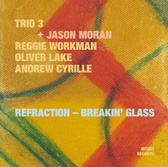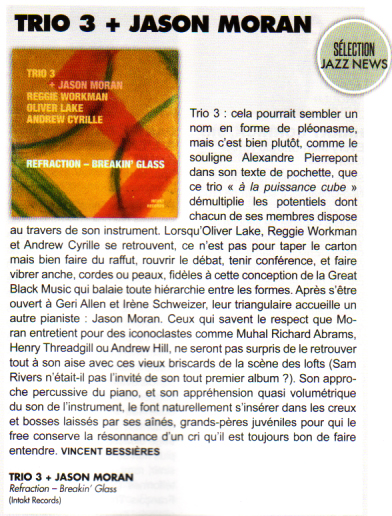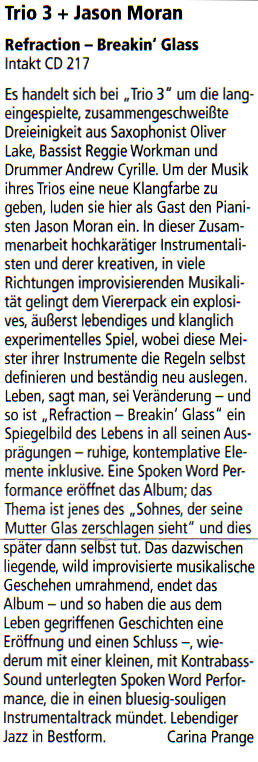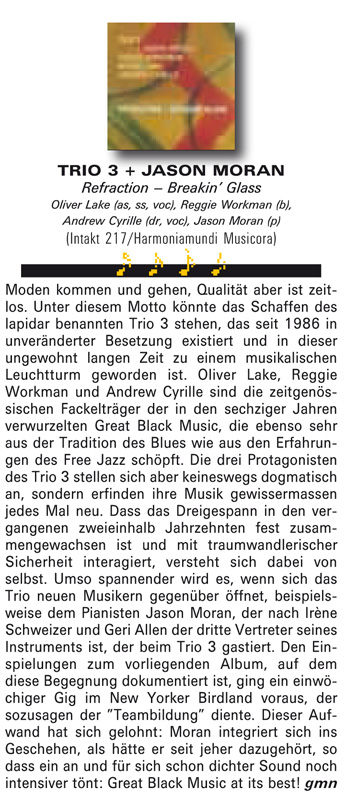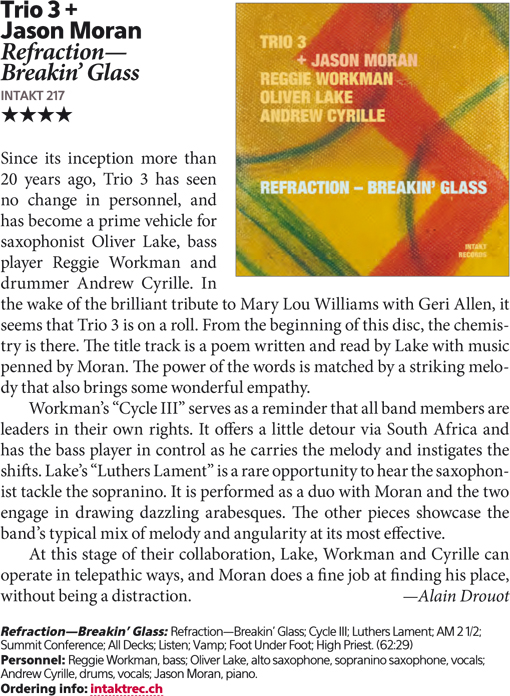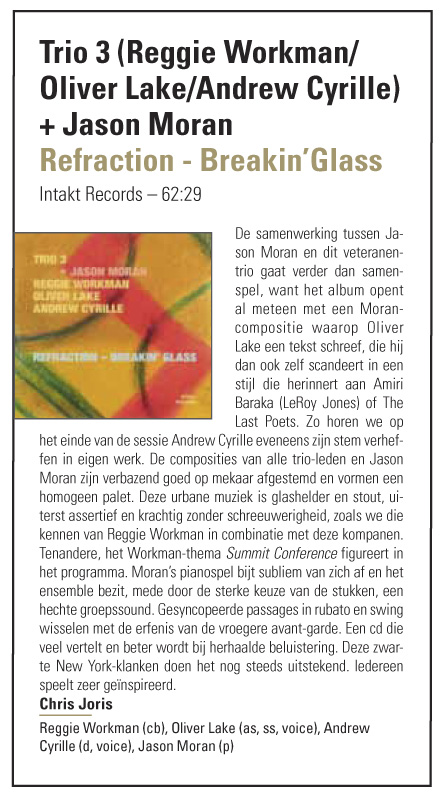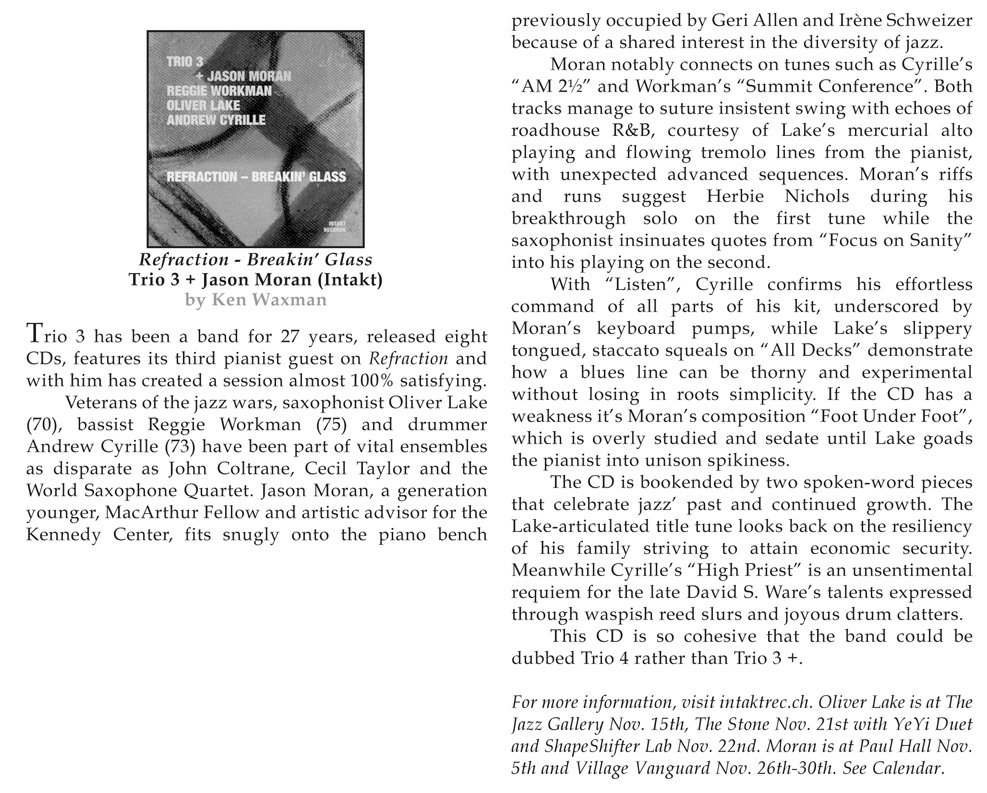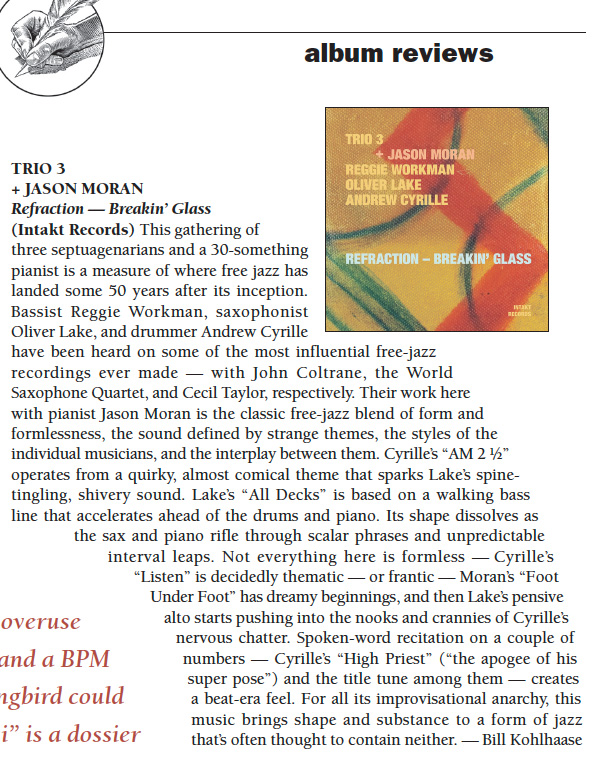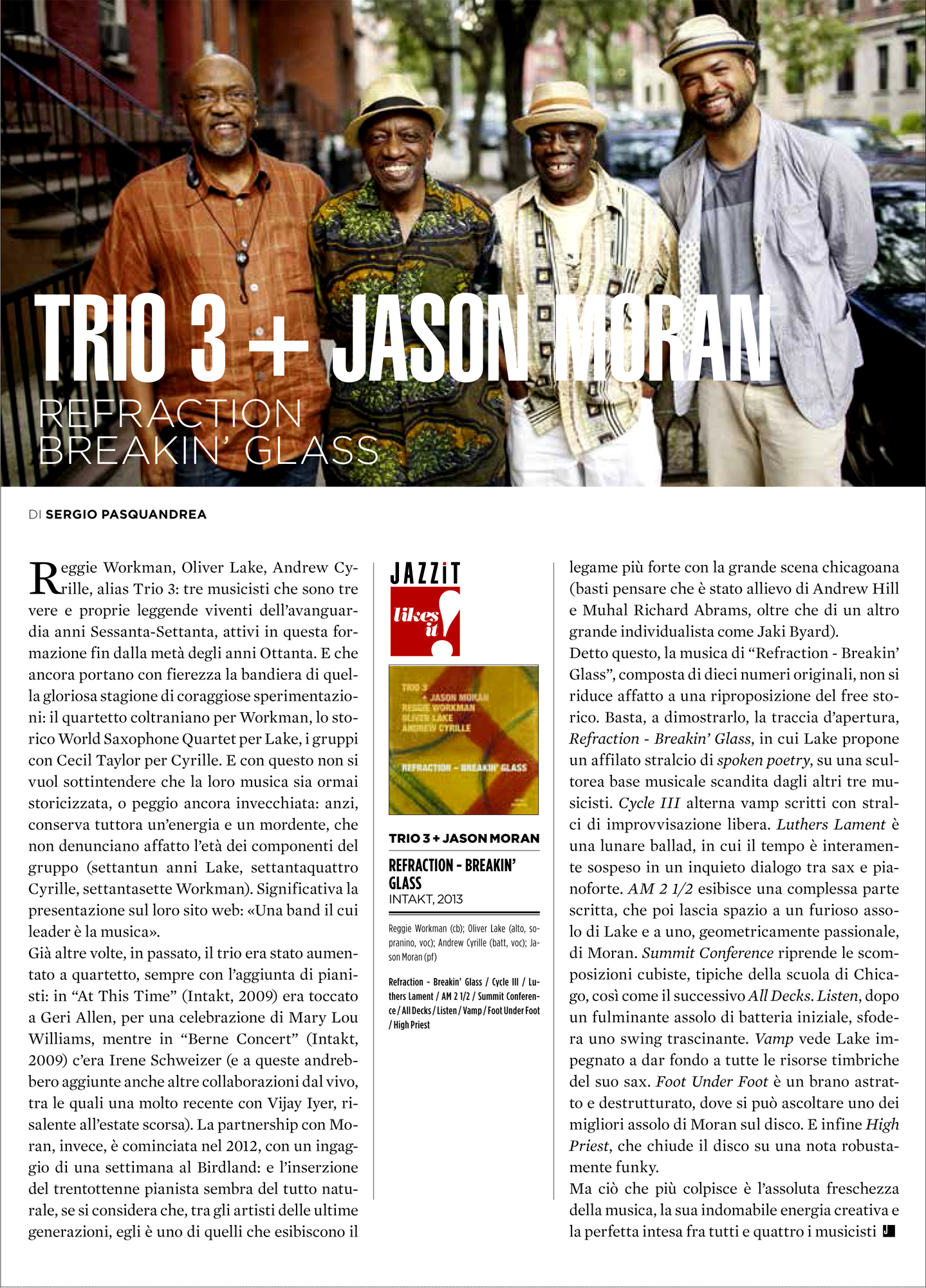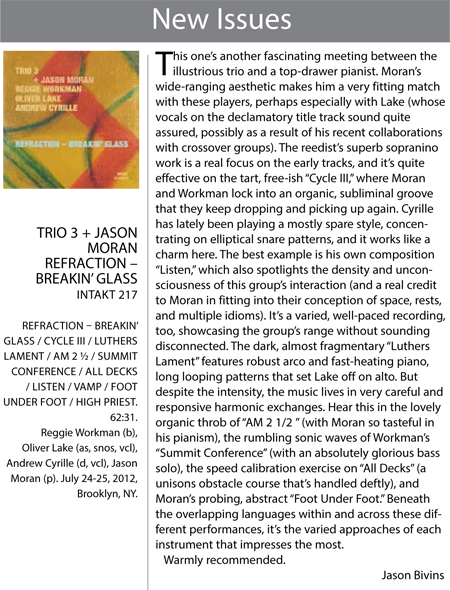INTAKT
RECORDS –
CD-REVIEWS
Trio 3 + Jason Moran
Refraction – Breakin' Glass
Das TRIO 3, das ist Intakts Verankerung im Ocean der Great Black Music, die in Oliver Lake, Reggie Workman & Andrew Cyrille drei ihrer großen Fahrensmänner hat. Für Refraction - Breakin' Glass (Intakt CD 217) addierten sie den Pianisten JASON MORAN zu ihrer ebenso verschworenen wie anschlussfähigen Gemeinschaft. Der Texaner, mit Jahrgang 1975 eine halbe Portion im Vergleich zu den drei Veteranen, hat sein Steuermannspatent an der Seite von Greg Osby und Stefon Harris auf dem Schulschiff 'Blue Note' erworben und bewährte sich als erster Offizier bei Jack DeJonette, Paul Motion und Charles Lloyd, bei dem er fest angeheuert hat. Referenzen genug, um hier den Titelsong zu schreiben, ja, Song, bei dem sich Lake an seine Kindheit in St. Louis erinnert, wo seine Mutter ein Restaurant betrieb. Er gibt auch bei 'Foot Under Foot' die träumerische, gedankenspielerische Richtung vor, bevor Lake alles Bedenkliche zerstreut, ansonsten werden die Ideen reihum vorgeschlagen. Es sind Vorschläge für melodisches, für derart alte Hasen aber erstaunlich verspieltes Miteinander. Mit hellen, räsonnierenden oder temperamentvoll sprudelnden Gesängen von Lake auf dem Alto- oder Sopranosaxophon, mit markanten Bassstrichen von Workman, und leichthändigem Dirigat durch Cyrills cymballuftigem Drumming. Moran ist nicht der Typ, der sich auf Comping und Vamping festlegen lässt. Er interagiert schon auch als quirliger Perler und Swinger wie bei 'AM 2 1/2', lieber aber kontrapunktisch, pointiert und als perfekter Vermittler, der mit überraschenden neuen Sichtweisen neue Diskussionen anstößt. 'Summit Conference' legt zumindest so ein Bild nahe, wobei hier insbesondere auch Cyrilles Statement hervorragt. Öfters als linear und rund, sind die Stück vieleckig, vielfältig und offen. Modernistisch durch und durch, aber lieber anziehend und spritzig als 'experimentell'. 'All Decks' gefällt durch eine Reihe von Accelerandos, Cyrilles 'Listen', von ihm selbst solo eingeleitet, durch sein repetitives Stop & Go, bevor einmal mehr Lake seinen Blackbird-Gesang anstimmt, der bei 'Vamp' besonders impulsiv und spitz ausfällt und in einem kecken Kreiseln mündet. Zuletzt besingt Cyrille einen 'High Priest', den jedoch keiner so richtig ernst nehmen kann. Lake singt über locker gedrehten Runden sein letztes Plädoyer für Freimut und Lebenslust und lässt dabei nicht alle, aber die meisten 38-jährigen alt aussehen.
Vincent Bessières, Jazznews, Août - Septembre 2013
Carina Prange, Jazzpodium, Juli / August 2013
Ennesima quadratura d'eclatante profilo per il Trio 3 di Lake-Workman-Cyrille: dopo le prove di estremo interesse insieme ad Irène Schweizer ed il doppio appuntamento con Geri Allen (a seguire il debut-album in trio Time Being, tutti per Intakt), oltre ai passaggi live con Vijay Iyer l'interfaccia pianistica è nel presente caso designata in Jason Moran: condensando un rapido identikit del trio all-stars nella loro progettuale "improvvisazione organica attraverso l'intero vocabolario del jazz", il più giovane pianista, fresco di duo con Charles Lloyd, ha già definito buona parte dei suoi orientamenti anche per la militanza ormai poliennale con figure del calibro e dello stile di Steve Coleman o Don Byron.
Trio 3 (o lo que es lo mismo Reggie Workman -1937-, Andrew Cyrille -1939- y Oliver Lake -1942) cuenta en Refraction – Breakin' Glass nuevamente con la colaboración de un pianista. Tras Irène Schweizer (Berne Concert) y Geri Allen (por partida doble en At This Time y Celebrating Mary Lou Williams. Live At Birdland New York), en esta ocasión es el turno de Jason Moran. Moran es un músico que a pesar de que todavía está en la treintena ha demostrado que es un enorme pianista tanto en las grabaciones a su nombre y liderando el proyecto Jason Moran and the Bandwagon, como con sus colaboraciones, entre otros con Greg Osby y Charles Lloyd, o en la reciente grabación de Ralph Alessi en ECM. Cada uno de los cuatro músicos aporta entre dos y tres composiciones. A pesar de la diferencia generacional, se entienden a la perfección, de tal modo que el tema que da título al disco no desentonaría en absoluto en el repertorio de Jason Moran and the Bandwagon. Los temas van recogiendo diferentes influencias. No obstante, más que la variación estilística -que es una cuestión formal- lo importante es la manera en que el grupo interactúa, y la manera en que el piano de Moran se imbrica con sus tres compañeros. La grabación es jazz de 2013, pero no desde el enfoque de la contemporaneidad, sino por su mirada hacia las esencias y su capacidad de transmitir la libertad que se le supone a este género. Pachi Tapiz, Tomajazz, Spain, 2013
That raw, elemental, soul-baring jazz sound inspired by Albert Ayler and late-period John Coltrane has fewer guardians nowadays, perhaps as cutting-edge jazz has reverted to structures, albeit more precisely mathematical ones. But three of its most creative current representatives are Trio 3 – performers with close connections to the African-American "New Thing" of the 1960s in sometime Coltrane bassist Reggie Workman, drummer Andrew Cyrille, and World Saxophone Quartet alto and sopranino player Oliver Lake. Trio 3 date from 1986, but they've enjoyed very fruitful recent collaborations with brilliant contemporary pianists – Geri Allen and Irène Schweizer, and now Charles Lloyd sideman Jason Moran. Long passages on this set still involve the uninhibited Lake unleashing wild, multiphonic sounds and high-end inquisitions, or Workman scurrying through tumbling group-improv episodes with dark bowed-bass slurs. But the set is full of good tunes, too, such as the nu-funky, distantly Bad Plus-like title track, Cyrille's free-swinging Listen and the jarring, exclamatory Vamp. Moran steers everybody with ingenious hooks, and his own loose-limbed solos show how inventive he can be whether the setup is prescriptive or non-existent.
If ever there was a threesome that hankered after being a quartet, it's Trio 3. Though working as a self-contained unit since 1986, pianists have often supplemented the core triumvirate, and in fact one has augmented each of the group's previous three recordings. Now Jason Moran fills the piano stool on Refraction—Breakin' Glass, adding to an already heady brew. From bassist Reggie Workman's youthful stint with John Coltrane, to drummer Andrew Cyrille's 11-year tenure with piano iconoclast Cecil Taylor, via saxophonist Oliver Lake's pioneering work as a founder member of the illustrious World Saxophone Quartet, their experience touches on many of the major innovations over the last 50 years. That makes Moran a good match: he studied with three great teachers—Jaki Byard, Andrew Hill, and Muhal Richard Abrams—but has found his own critically-acclaimed path, strong on rhythmic ingenuity. In the summer of 2012, Moran joined the group for a week long residency at NYC's Birdland before going into the studio. That explains the tightness which pervades the ten cuts which constitute the program. It's a collective effort. No-one rests on their laurels. Each contributes tunes, which cover a wide stylistic spectrum, creating a winning mix of free form abstraction, kinetic riffs, and inventive interplay, studded with biting solos. Part of the joy of Trio 3 lies in the way even the relatively straightforward numbers feel on the edge of falling apart in a welter of delicious dissonance and arhythmic clatter, but never quite do. Case in point is Workman's classic "Summit Conference" opens in a swirling rubato from which the theme emerges out of nowhere, before parting for a series of adventurous features. Likewise on Lake's "All Decks," time expands and contracts, but even when piano and alto saxophone lock, Cyrille combines grace and power in an unfettered commentary. On the title track, they pull off no mean feat in marrying Moran's ominous lop-sided vamp with Lake's recitation of a wry poem about his mother's drive to make good. Unlike many combinations of jazz and verse, it bears repeated listening, due to the reedman's matter-of-fact delivery and the essential human truth it conveys, not to mention his incisive squealing alto. Other highlights are too many to recount, but include Workman's careening woody bowing on his lilting "Cycle III," Cyrille's throbbing tattoo on "Listen" which sets the scene for a call and response, presaging a procession of supercharged solos, and his propulsive homage to the late saxophonist David S. Ware on the surging "High Priest." After such a successful amalgam, ranking alongside gems like Time Being (Intakt, 2006) and The Berne Concert (Intakt, 2009), it should be no surprise that Trio 3 hooked up with yet another rising star of the keyboard in Vijay Iyer at Birdland in July 2013. There may yet be more collaborative entries to look forward to in the band's discography.
Marc Chénard, La Scena Musicale, August 28, 2013 (english) Marc Chénard, La Scena Musicale, August 28, 2013 (french)
The trio—launched in 1986—comprises three legendary maestros of progressive jazz and improvisation. Customarily, the band augments its line of attack with a guest pianist. Here, Jason Moran upholds the tradition and plays an integral role, augmenting the core unit's reach into pieces fabricated with kaleidoscopic formations and variegated hues, spanning a myriad of seamlessly integrated jazz-related mosaics. Essentially, nothing seems out-of-scope for these gents.
Interview with Andrew Cyrille, Ken Weiss, Jazz Inside Magazine, August 2013, USA (PDF-File)
In questi ultimi anni Oliver Lake sembra rinato. La sua apparizione al festival di Saalfelden nel 2009 con il Reunion Trio (Michael Gregory alla chitarra e uno strepitoso Pheeroan akLaff alla batteria) sollevò un inaspettato entusiasmo. La stessa impressione si trae dall'ascolto di questo CD, registrato in studio nel luglio 2012, in cui il settantenne altoista è uno dei membri del paritario Trio 3, assieme a Reggie Workman e Andrew Cyrille. Giunto alla sua quinta incisione per la Intakt, il trio viene qui integrato dal trentottenne Jason Moran, che prende il posto di Irene Schweizer (in Berne Concert) e di Geri Allen (in At This Time e Celebrating Mary Lou Williams (Live at Birdland New York)), presenti in altre precedenti collaborazioni del medesimo trio.
Marco Maimeri about Jason Moran, JazzColours, Ottobre 2013, Italy (PDF-File)
All About Jazz
Jazzism Top 2013
Le Trio 3, qui n'a plus à faire ses preuves, ne lui cède en rien. Le Trio 3, c'est l'excellence : trois grands musiciens afro-américains, Oliver Lake, Reggie Workman et Andrew Cyrille, qui ont pris l'habitude d'inviter un pianiste arpenter les grands chemins avec eux ; en l'occurrence, une pianiste, Irène Schweizer d'abord, puis Geri Allen à deux reprises. Cette fois, c'est leur cadet Jason Moran, avec spontanéité, respiration, autorité et swing, qui ajoute beaucoup à la dimension architecturale du groupe. Du pur jazz pour un pur moment de bonheur ! Jean Buzelin, Culturejazz France. 14 janvier 2014
Chris Searle, Morning Star, August 4, 2015
|
